In today's complex business environment, the existence of a contract and those similar to it are essential to make sure that the parties on either side of a business agreement have…
continue reading
31+ Sample Advance Directives
-
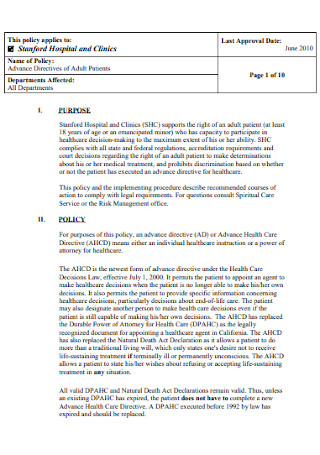
Advance Directives of Adult Patients
download now -
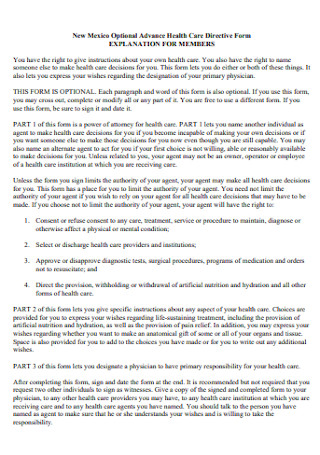
Advance Health Care Directive Form
download now -
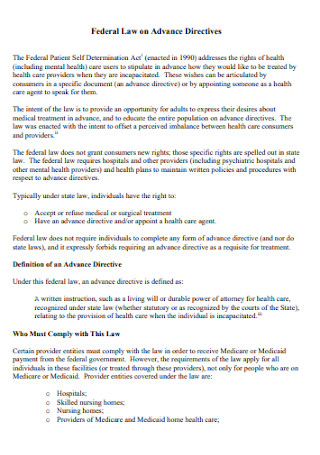
Federal Law on Advance Directives
download now -
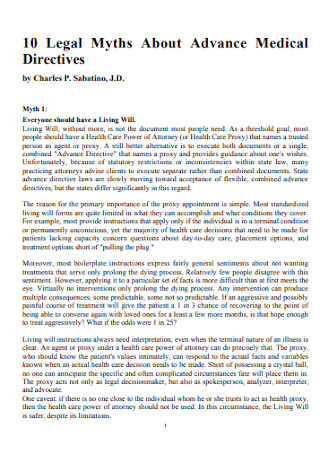
Advance Medical Directives
download now -
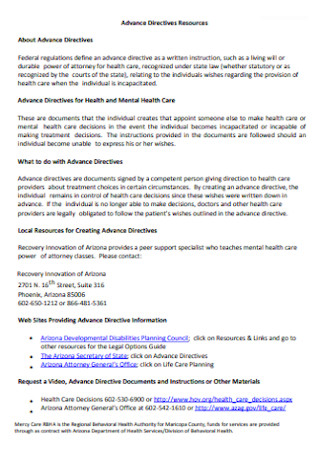
Advance Directives Resources Template
download now -
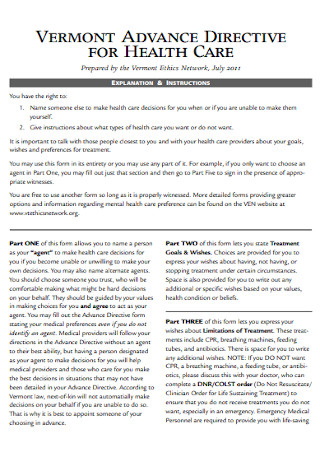
Advance Directive for Health Care
download now -

Health Care Planning for Advance Directives
download now -
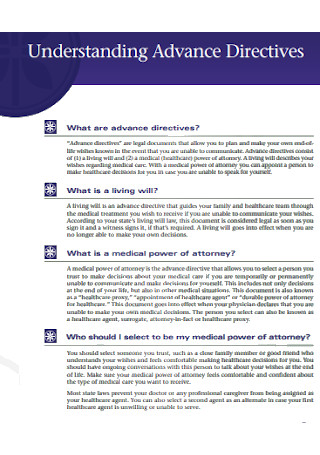
Understanding Advance Directives
download now -
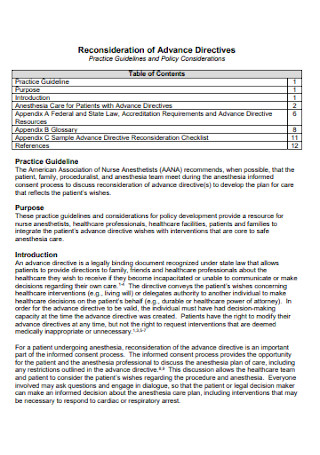
Reconsideration of Advance Directives
download now -
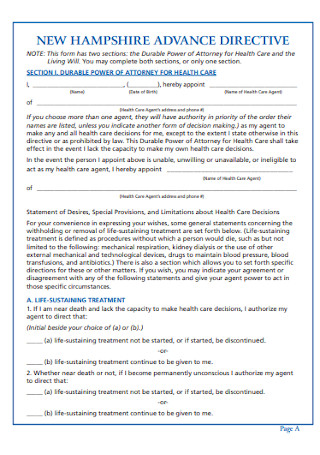
New Hampshire Advance Directive
download now -
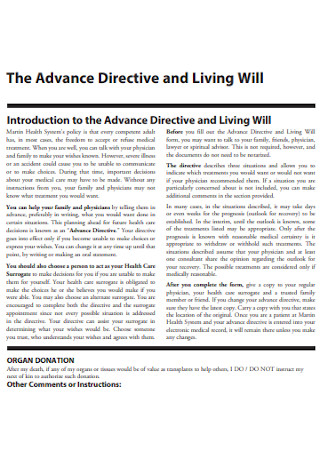
Advance Directive and Living Well
download now -
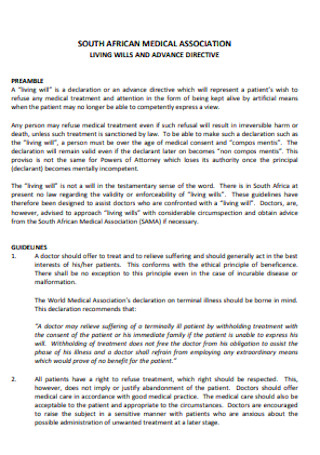
Living Will and Advance Directive
download now -
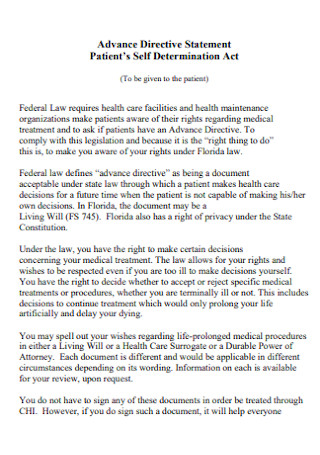
Advance Directive Statement Template
download now -
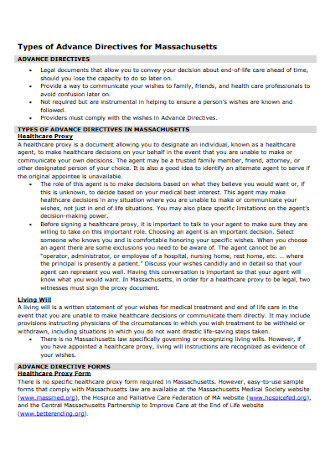
Advance Directives for Massachusetts
download now -
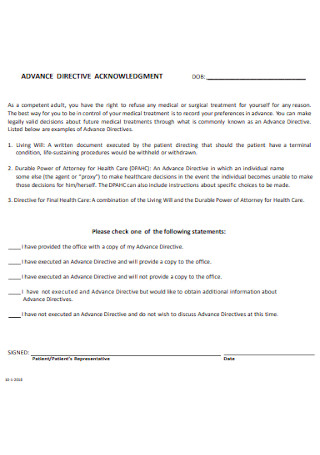
Advance Directive Knowledgement Template
download now -
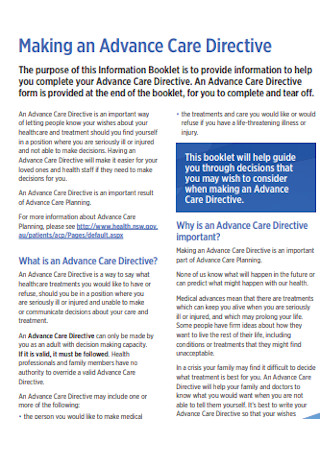
Advance Care Directive Template
download now -
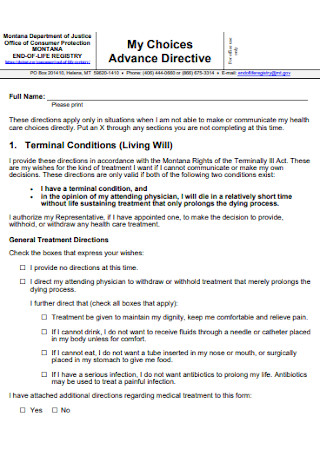
My Choices Advance Directive
download now -
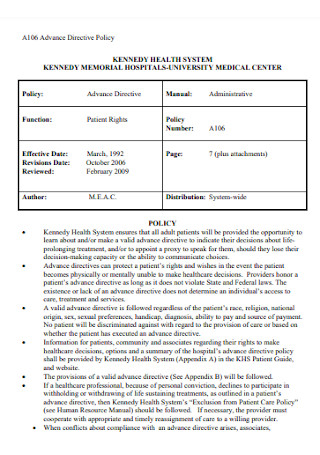
Advance Directive Policy Template
download now -
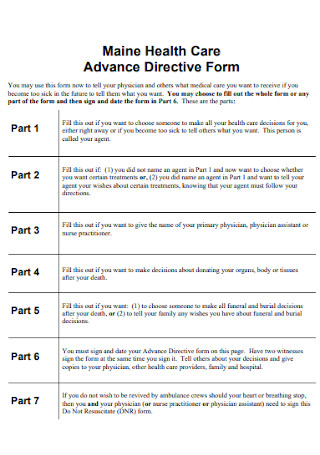
Health Care Advance Directive Form
download now -
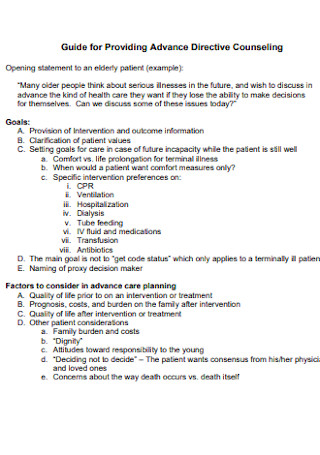
Advance Directive Counseling Template
download now -
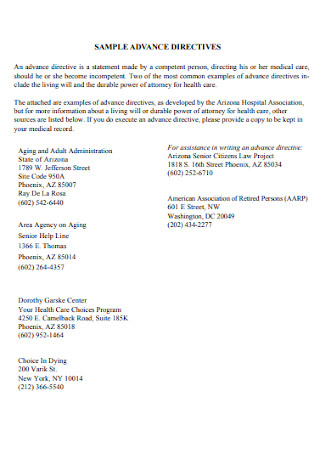
Sample Advance Directive Template
download now -
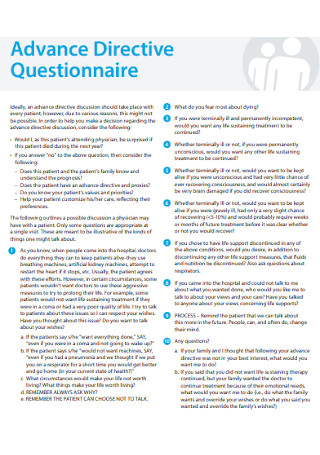
Basic Advance Directive Questionnaire
download now -
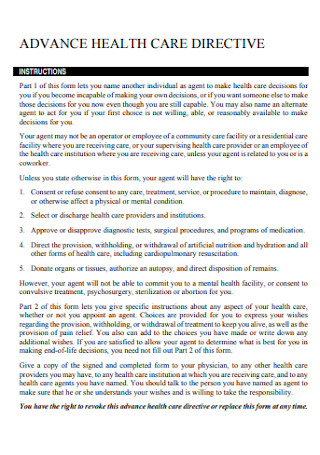
Advance Health Care Directive
download now -
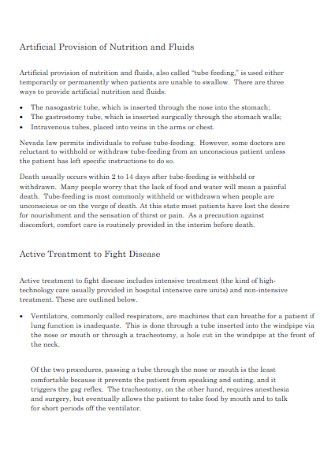
Patient Information on Advance Directive
download now -
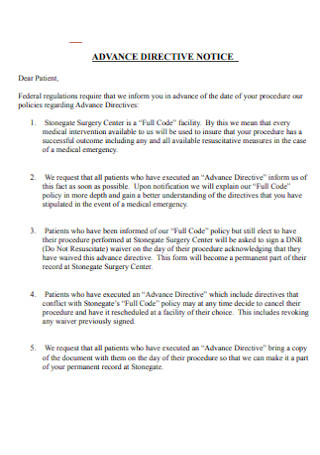
Advance Directive Notice Template
download now -
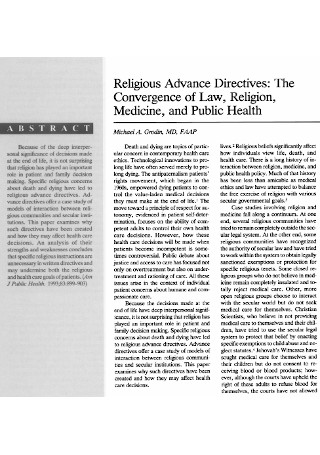
Religious Advance Directives
download now -
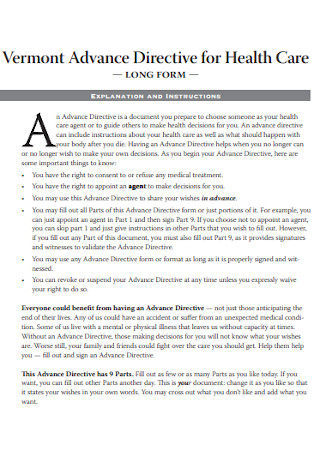
Vermont Advance Directive for Health Care
download now -
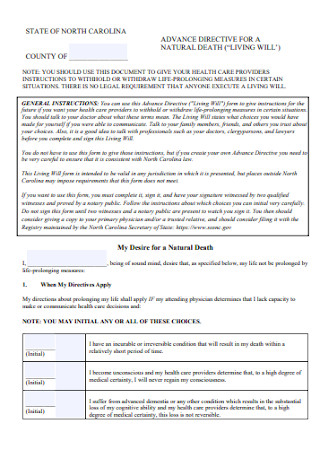
Advance Directive for Natural Death
download now -
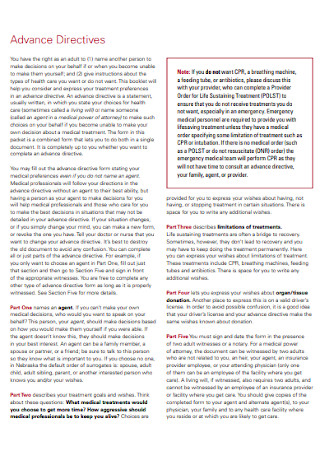
Printable Advance Directives
download now -
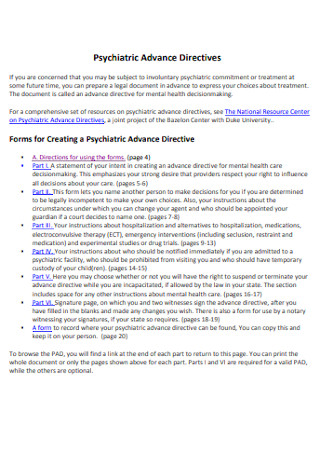
Psychiatric Advance Directives
download now -
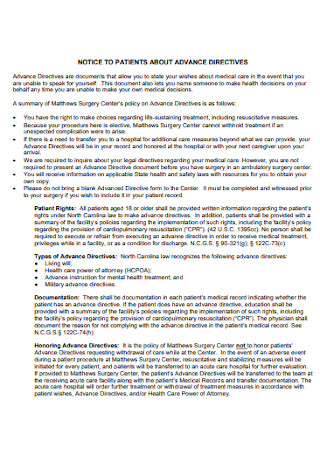
Notice to Patient for Advance Directives
download now -
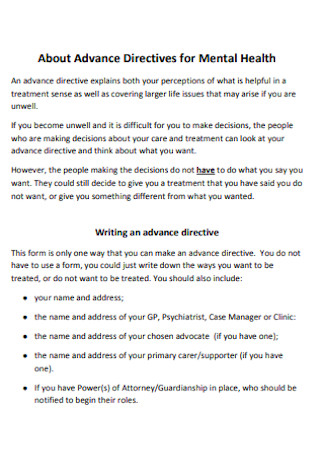
Advance Directives for Mental Health
download now
What Is an Advance Directive?
An advance directive is a legal, medical record that details how you want medical decisions you made if you cannot make them for yourself. An advance directive informs your health care team and loved ones about the type of health care you desire and who you wish to make decisions for you if you are unable to do so. An advance directive can assist you in planning for the type of care you desire. It may help your family and health care team make informed decisions about your health care when you cannot do so. An advance directive is intended to assist you in planning and communicating to others the type of care you desire.
It is used to help your family and health care team make informed decisions about your care if you cannot make medical decisions independently. These medical decisions may require your health care team to take extraordinary measures or provide emergency care. Advance directives are only applicable to health care decisions; they have no bearing on financial or financial matters. Advance directive laws vary by state. Consult your health care provider about completing an advance directive. At the same time, you are still healthy if you become too ill or incapable of making medical decisions in the future. Over a third of grown-ups in the United States have advanced medical directives, according to statistics. According to a new study, approximately 37% of Americans have advanced directives for end-of-life care if they become seriously sick or incapable of making healthcare decisions.
Benefits of an Advance Directive
Advance care planning is critical for your peace of mind and the well-being of those you care about. Making an advance directive is an excellent place to start when it comes to caring planning. If you cannot speak for yourself, a living will specify your preferences for your health care, and a health care proxy is someone you name to act on your behalf regarding medical treatment if you cannot speak for yourself. Even if you’re in good health, there are six reasons why you and your loved ones should prepare advance directives.
Types of Advance Directive
There are numerous formats for advance directives. Some are based on state-mandated forms, while others are created by lawyers or even the patients themselves. State statutes and courts determine the validity of these documents. Each state and the District of Columbia have enacted legislation governing advance directives. Ascertain that you are familiar with the specific requirements for drafting legal advance directives in your state. Before preparing an advance directive, you should consult with your health care provider, family members, and at least one person you may wish to name your proxy or agent. Inform them of your situation, wishes, and fears, as they are the ones who will assist you in carrying out your wishes if you are unable to do so. Advance directive forms are typically available through your state bar association or Caring Connection. When the time comes for you to complete your advance directive, your health care team may assist you.
The Living Will
The living will is a legal record used to specify certain future health care decisions for individuals who cannot make them independently. The living will select the type of medical treatment plan the individual wishes to receive or does not wish to receive in these circumstances. It can determine the cases under which an attempt to prolong life should be initiated or discontinued. This includes dialysis, tube feedings, and actual life support. Before your health care team can use your living will to guide medical decisions, two physicians must confirm that you cannot make your own medical decisions. A person can still receive treatments such as antibiotics, food, or pain medications. It is the goal of treatment shifts from cure to comfort. A living will be terminated or revoked at any time. Ensure that you are familiar with your state’s specific regulations. If you consume most of your time in more than one state, consult your health care provider and familiarize yourself with each state’s laws.
Durable Power of Attorney for Health Care
This is also known as medical power of attorney, a legal document where you appoint someone to work as your agent if you cannot make your own health care decisions. Before a medical power of attorney can control medical decisions, the individual’s physician must certify that the individual cannot make decisions independently. If you become unable to make health care decisions for yourself, your proxy or agent can communicate with your health care team and other caregivers on your behalf and make decisions based on the wishes or directions you previously provided. If your proxy or agent does not know your wishes in a particular situation, they will decide based on what they believe you want. If you regain the ability to make medical decisions on your own, your proxy cannot continue to act on your behalf. Your proxy or agent should be someone who is familiar with you and whom you trust to carry out your wishes. Your proxy or agent should understand how you would make decisions if you were able and should feel comfortable asking questions and advocating on your behalf to your health care team. Make sure that you discuss your wishes in detail with that individual. Also, you may designate a backup person if your first choice is unable or unwilling to act on your behalf. Laws governing durable powers of attorney vary by state. Consult your health care team and familiarize yourself with your state’s laws.
POLST
A POLST form can also be used to express your health-care preferences, but it is not an advance directive. A very ill individual can fill out a POLST form and ask their health care practitioner to sign it, which contains a list of precise medical orders. In an emergency, a POLST form addresses your wishes, such as whether to use CPR, go to the hospital and be comfortable. Without a POLST form, emergency professionals are obligated to provide you every treatment feasible to keep you alive.
How To Take Care of a Sick Person
Illness or disability can strike suddenly. If you find yourself in charge of caring for a loved one, these steps can assist you.
Step 1: Investigate the possibility of acquiring a power of attorney.
This legal instrument gives you the authority to make legally binding choices on behalf of your loved ones, as well as access to their bank accounts and financial statements. In most cases, the individual providing you power of attorney must do it in writing. A conservatorship may be an option if your loved one refuses to give you power of attorney. When someone is unable to converse with others or sign documents, a court-ordered arrangement is adopted. A court-appointed conservator would manage the individual’s asset lists in the best interests of the individual.
Step 2: Determine the things you’ll need to complete.
If you’re asked to assist with food preparation, it could range from weekly grocery shopping to feeding someone unable to use utensils. If you are asked to help with medication, you may be required to count pills and place them in clearly marked containers once or twice a week. However, it could also refer to the monitoring and maintenance of complicated medical systems like infusion pumps. It might even entail giving shots every day.
Step 3: Make sure the house is secure and accessible.
To go around, your loved one may require ramps, elevators, grab bars, and other such amenities. Make sure there’s adequate room for a walker or wheelchair around the furnishings. Rugs and loose cables can trip people who use walkers, canes, or crutches. Remote controls for heat, air conditioning, entertainment systems, and lights that are simple to operate can help those who are unable to go around independently. Research shows that Americans spend approximately 90% of their time indoors, where the concentrations of some pollutants are frequently two to five times those found outdoors.
Step 4: Check to see if your loved one can stay at home.
That may be the best option, but the decision may not be straightforward. Moving your loved one in with you or to an assisted living facility or nursing home are other alternatives. Talk to your loved one’s doctors, nurses, physical therapists, and mental health care providers, as well as the person you’d be caring for, about the options.
Step 5: Find out what kind of expert assistance is available.
Visiting home health aides can help you fill in gaps in your caregiving efforts and enhance the condition of life for your loved one. Determine which services are available in your neighborhood and whether they are covered by insurance.
FAQs
Is it possible for family members to override an advance directive?
A living will is an essential element of any estate plan. However, your family will not be able to override your living will. They can’t take away your ability to make decisions about your treatment and care. In reality, you always have the option of overriding your own choices.
What if you don’t have an advance directive in place?
Without an advance directive, if you become unable to make medical decisions for yourself, you may be given medical attention that you would not have desired. In the absence of an advance directive, your doctor may consult with your family regarding your treatment.
What happens in the absence of a living will?
If you pass away without issuing a will, you are said to have died “intestate.” When this happens, your property will be allocated according to the intestacy laws of the state where you live. Any bank accounts, securities, real estate, and other assets you own at the time of death are included.
Is a do-not-resuscitate order an advance directive?
An advance directive may also include a do-not-resuscitate (DNR) order. This is accomplished through cardiopulmonary resuscitation (CPR). A DNR is a request to forego CPR if your heart stops beating or your breathing stops. You may use an advance directive form or inform your physician that you do not wish to be revived.
Advance directives play a critical role in health care. Nobody can predict when unforeseen medical events will occur. An advance directive enables loved ones and medical personnel to make essential decisions in a medical emergency. Having an advance directive in place guarantees that your health care wishes are carried out, even if you cannot communicate them.

